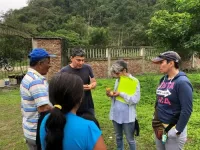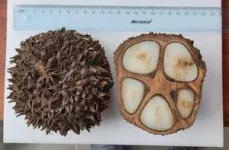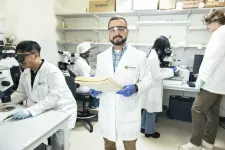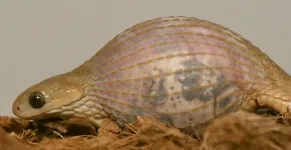(Press-News.org) URBANA, Ill. – The ivory palm tree, also known as tagua, is endemic to the Chocó-Darien region on the Pacific coast of South America. The local population relies on this unique tree for many uses and the tagua fruit, nuts, and leaves provide materials for a range of products. Two studies from the University of Illinois Urbana-Champaign and Pontificia Universidad Católica del Ecuador (PUCE) explore the ecosystem services provided by tagua in coastal Ecuador.
The ivory palm is considered a threatened species as 98% of forest land in western Ecuador has been cleared, although current conservation practices often leave the tagua trees standing amidst agricultural land.
The tree’s large, characteristic fruit contains seeds that harden into a white material known as vegetable ivory, which is harvested and traded in the global marketplace.
“Since the start of the 20th century, companies have been utilizing the seed of this palm to produce buttons, and it is very popular in the global garment industry. The tagua trade had a strong impact on the local economy of western Ecuador in the first half of the 20th century,” said Rommel Montúfar, professor at PUCE and co-author on both papers.
The button export has slowed over the past decades, but there are efforts to develop other materials from tagua fruit and nuts.
“Some companies are trying to use powder from tagua nuts as ingredients in cosmetic products for skin exfoliation and other applications. There is a huge interest in tagua nanotechnology, as it can be used as a substitute for plastic or in medical applications,” Montúfar explained. “But the question is if there will be enough natural materials to support these initiatives. Our research provides input for conservation efforts.”
For the first study, the researchers conducted focus groups in three tagua harvesting communities in western Ecuador.
“As economists, we would assume the most important value has to be the export of the tagua buttons. But we wanted to go into the research without any assumptions and let the participants tell us what's important to them about this resource,” said Shadi Atallah, associate professor in the Department of Agricultural and Consumer Economics (ACE), part of the College of Agricultural, Consumer and Environmental Sciences (ACES) at U. of I. Atallah is corresponding author on the studies.
“We wanted to learn how the local population depends on tagua for their livelihood. We already had an idea about the economic impacts, but these communities use the palm for a lot of other purposes, which need to be brought to light if we're thinking about conservation,” explained co-author Jacob Gehrung, analyst with Resilient Buildings Group. He helped conduct the field research in Ecuador as an undergraduate student at the University of New Hampshire.
Based on the focus group discussions, the research team identified 28 ecosystem services, divided into four categories.
Provisioning services include practical purposes, such as material for buttons, artisanal crafts, and roof thatching, as well as human food and medicine. Regulating services include, for example, habitat conservation, pollinator attraction, and shade for humans and animals. Supporting services refer to the palm’s interaction with animals and other plants in the environment. Cultural services include the role of the tree in cultural identity, religious activities, and recreation.
While the button trade is the most frequently studied aspect of the tree, it wasn’t the main topic of the focus group discussions. Participants viewed it as too unstable and unpredictable because prices fluctuate with global demand and fashion trends.
The most frequently mentioned provisioning services were the use of leaves for thatching roofs, a traditional practice that is still used in some locations, followed by food and medicine. But overall, participants spoke more about cultural and supporting services than provisioning.
For the second study, the research team developed a survey to further explore and quantify the importance of different ecosystem services. They collected responses from 80 tagua harvesters in six communities, all with less than 200 inhabitants and a high poverty rate.
The harvesters rated their household’s livelihood dependence on 17 different tagua ecosystem services, derived from the focus group data. Respondents were asked to rate dependence from the point of view of their grandparents, parents, their own, and the future generation.
“Overall, people depend less on tagua today than their grandparents did. However, the earlier boom of the tagua trade affects how they feel about the future. They have expectations that at some point the trade will come back, and that it will play a bigger role for their children,” said Jorge Salgado, who is co-author on the second paper. Salgado taught economics at PUCE and is currently pursuing a doctoral degree at the University of Lausanne.
“These villages are some of the poorest in Ecuador. It’s important to understand how they feel about the different services that nature is providing them. Policymaking shouldn’t happen from the top down; it should be based on input from the communities,” he added.
The surveys showed some respondents are concerned their children are less culturally attached to tagua and the culture will erode.
“However, there is a correlation between what they expect is going to happen economically and culturally. This indicates that investing in the economics of tagua could also bring back the cultural attachment,” Atallah noted.
The research findings have implications for policymakers looking to implement sustainable harvesting practices and promote economic development.
“The local harvesters are not just thinking about money, they are also interested in cultural issues and the tree’s role in supporting plants and animals.” Atallah said. “Ecuador’s environmental authority seeks to determine what makes a sustainable harvest. However, it’s important to recognize that there is a bouquet of uses, not just the export business. Policymakers need to take these complementarities and trade-offs among ecosystem services into consideration, so they don’t over-emphasize one aspect at the detriment of the others.”
The first paper, “Identifying the Ecosystems Services of the Ivory Palm (Phytelephas aequatorialis Spruce): A Qualitative Study from the Central Coast of Ecuador,” is published in Economic Botany [doi.org/10.1007/s12231-022-09552-9]. Authors include Rommel Montúfar, Jacob Gehrung, Michael Ayala Ayala and Shady Atallah.
The second paper, “Intergenerational livelihood dependence on ecosystem services: A descriptive analysis of the ivory palm in coastal Ecuador,” is published in Agricultural and Resource Economics Review [doi.org/10.1017/age.2023.21]. Authors include Jorge Salgado, Rommel Montúfar, Jacob Gehrung, and Shady Atallah.
Support for the research was provided by Pontificia Universidad Católica del Ecuador, the Universidad Central del Ecuador, the International Joint Laboratory BIOINCA, and the University of New Hampshire’s Hamel Center for Undergraduate Research.
A photo album with tagua tree pictures is available through Box.
END
How local communities depend on the ivory palm tree in coastal Ecuador
2023-08-25
ELSE PRESS RELEASES FROM THIS DATE:
Grant to help students continue research in nematodes
2023-08-25
Kennesaw State University biology professor Brandon Carpenter was inspired to pursue a career in science because of an undergraduate research experience. With a recent grant from the National Institutes of Health (NIH), he’ll provide a similar experience to his students.
Carpenter, an assistant professor of cellular and molecular biology who studies neurodevelopmental disorders and genetic mutations, received a $432,000 grant to continue research that will help uncover the mechanisms that regulate inheritance of ...
Move over pythons: These snakes are the real champion eaters
2023-08-25
Pythons have huge appetites, but which snake would win an eating contest?
Surprisingly, it’s a harmless little African snake that consumes eggs whole like an amuse-bouche.
Biologist Bruce Jayne at the University of Cincinnati discovered that this species, Dasypeltis gansi, can consume bigger prey relative to its own length and mass than even Burmese pythons, among the most massive snakes on Earth.
“They probably would hold the Guinness world record,” said Jayne, a professor of biological sciences in UC’s College of Arts and Sciences.
“It’s spectacular but on a small scale,” he said. ...
Families with a team mindset strengthened their bonds during COVID-19 pandemic
2023-08-25
Despite reports of families disintegrating under the hardships and constraints of the COVID-19 pandemic, a new study suggests that many families may have formed stronger bonds instead.
One key difference between families that emerged from the pandemic stronger and unified compared with those that struggled was having a cohesive, family-oriented mindset. Families in which individuals perceived themselves as members of a team who were working for their collective benefit and found personal fulfillment in meeting the wants and needs of the other members were more likely to improve their ...
New human cell-based 3D model reveals insights into how immune cells contribute to Alzheimer’s disease
2023-08-25
Key Takeaways
Researchers developed a new 3D model of Alzheimer’s Disease that allows them to study the role of immune cells in the disease
They found that infiltration of immune cells significantly increases in brains with AD pathology and contributes to neurodegeneration and neuroinflammation
The team also identified potential strategies to halt this process, which could lead to the development of new therapies
BOSTON – Cognitive decline associated with Alzheimer’s disease (AD) develops when neurons begin to die, which can be caused by inappropriate immune responses and excessive ...
Spending on mental health services has risen by more than 50% since beginning of pandemic
2023-08-25
Spending on mental health services among Americans with private health insurance has surged since the beginning of the COVID-19 pandemic, continuing to rise even as the use of telehealth has plateaued, according to a new study.
Spending on mental health services rose by 53% from March 2020 to August 2022 among a large group of people with employer-provided insurance, according to researchers from the RAND Corporation and Castlight Health. During the same period, use of mental health services increased by 39%.
The researchers say it is uncertain if the trend will continue since some rules that expanded payment for telehealth ...
Patient experiences with hospitals worsened during first two years of pandemic
2023-08-25
The experiences of patients hospitalized during the COVID-19 pandemic was significantly worse than in the years before the crisis, with hospitals with higher staffing levels holding on to better scores longer, according to a new RAND Corporation study.
Patients particularly reported worse staff responsiveness and hospital cleanliness, possibly reflecting staffing shortages in the hospital workforce and the effects of protocols needed to limit the spread of COVID-19, according to researchers.
Deficits were largest for hospitals that in the pre-pandemic period were lower-performing and had lower staffing levels. ...
Changes in patient experiences of hospital care during the pandemic
2023-08-25
About The Study: The results of this study suggest that higher-staffed and higher-performing hospitals were more resilient to the conditions of the COVID-19 pandemic, but by late 2021, patients’ experience of care had declined in all hospitals.
Authors: Marc N. Elliott, Ph.D., of the RAND Corporation in Santa Monica, California, is the corresponding author.
To access the embargoed study: Visit our For The Media website at this link https://media.jamanetwork.com/
(doi:10.1001/jamahealthforum.2023.2766)
Editor’s Note: Please see the article for additional information, including other authors, author contributions ...
COVID-19 pandemic and associated inequities in heart attack treatment, outcomes
2023-08-25
About The Study: This study found that while the pandemic was associated with worse treatment and outcomes in patients with acute myocardial infarction (AMI; heart attack), race and ethnicity–associated inequities did not increase significantly. These findings suggest the need for additional efforts to mitigate outcomes associated with the COVID-19 pandemic for patients admitted with AMI when the hospital COVID-19 burden is substantially increased.
Authors: Laurent G. Glance, M.D., of the University of Rochester ...
Tides may be responsible for up to 69% of under-ice melting in an Antarctica ice shelf
2023-08-25
The ice shelves — the marine-terminating glaciers of the Antarctic Ice Sheet — are melting, and it's not just because of rising atmospheric temperatures. In a one-two punch, ice shelves in Antarctica are fighting a losing battle against rising temperatures both at the surface and under their body. Called basal melting, oceanic heat and compression contribute to the phenomenon, but tides may play a bigger role than previously thought, according to a multi-institution research collaboration based in China. Based on observational data in Prydz Bay, which ...
PolyU scholar’s transformative work on the Leidenfrost effect wins the Falling Walls Science Breakthroughs of the Year 2023
2023-08-25
Prof. Zuankai WANG, Associate Vice President (Research and Innovation) and Chair Professor of Nature-Inspired Engineering at The Hong Kong Polytechnic University (PolyU) has been bestowed one of the 10 winners of the Falling Walls Science Breakthroughs of the Year 2023 in Engineering and Technology category for his groundbreaking work on resolving the Leidenfrost effect.
The Award aims to foster research and innovation across all disciplines by celebrating cutting-edge discoveries. The Falling Walls Foundation, based in Berlin, established the Award to acknowledge the most recent breakthroughs in science and society worldwide.
Prof. WANG’s ...







